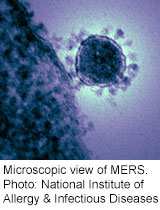- The Best Time of Day to Drink Bone Broth to Maximize Health Benefits
- 8 Ways to Increase Dopamine Naturally
- 7 Best Breads for Maintaining Stable Blood Sugar
- Gelatin vs. Collagen: Which is Best for Skin, Nails, and Joints?
- The Long-Term Effects of Daily Turmeric Supplements on Liver Health
- Could Your Grocery Store Meat Be Causing Recurring UTIs?
- Are You Making This Expensive Thermostat Error This Winter?
- Recognizing the Signs of Hypothyroidism
- 10 Strategies to Overcome Insomnia
- Could Artificial Sweeteners Be Aging the Brain Faster?
1st U.S. MERS Patient May Be Released From Hospital Soon


The man hospitalized in Indiana with the first U.S. case of a potentially fatal respiratory virus that initially surfaced in the Middle East two years ago is improving and could be released from the hospital soon, health officials reported Monday.
Indiana’s state Health Commissioner, William VanNess II, said no health-care workers or family members who’ve had contact with the patient have tested positive for the virus, which has an incubation period of up to 14 days, the Associated Press reported.
However, the still-unidentified man could remain in isolation at home, officials said.
State health officials had said over the weekend that no other cases of Middle East Respiratory Syndrome, or MERS, have been identified, the AP said.
The unidentified patient is a health-care professional who had been working at a hospital in Saudi Arabia. Saudi Arabia is the epicenter of the viral outbreak of MERS.
MERS has sickened hundreds of people in the Middle East, and kills about a quarter of the people who contract the virus, Dr. Anne Schuchat, director of National Center for Immunization and Respiratory Diseases at the U.S. Centers for Disease Control and Prevention, said during a Friday news conference.
Officials said Monday that the man didn’t remember coming in contact with MERS patients in Saudi Arabia. But the hospital where he worked did have MERS cases, the AP reported.
In some countries, the virus has spread from person to person through close contact, such as caring for or living with an infected person. But, there’s currently no evidence of sustained spread of MERS in general settings, the CDC said.
CDC and Indiana health officials said Friday that they didn’t yet know how the man had been infected with the virus, but added that it’s very likely that it happened in Saudi Arabia.
The man took a plane on April 24 from Riyadh, Saudi Arabia, to London, then from London to Chicago. He next took a bus from Chicago to Indiana. On April 27, he started experiencing “respiratory symptoms,” and was admitted to Community Hospital in Munster the next day, the CDC said.
Because of the patient’s symptoms — shortness of breath, coughing and fever — and travel history, Indiana health officials tested for MERS and confirmed the infection Friday afternoon, CDC officials said.
The CDC was working with the airline and the bus company to track down people who may have come in contact with the patient, Schuchat said Friday.
To date, there have been 401 confirmed cases of MERS in 12 countries, but all the cases originated in six countries in the Arabian Peninsula. Over 100 people have died. Officials don’t know where the virus came from or how it spreads. Currently, there is no available vaccine or recommended treatment for the virus, the CDC said.
“In this interconnected world we live in, we expected MERS to make its way to the United States,” Dr. Tom Frieden, director of the CDC, said Friday. “We have been preparing since 2012 for this possibility.”
People who come down with respiratory illness within 12 weeks of traveling to Saudi Arabia should notify their doctor, Schuchat said. The same goes for someone who becomes ill after contact with a person who has recently traveled to Saudi Arabia.
However, the CDC has not recommended that anyone change their travel plans based on the MERS virus, she said.
Camels have been identified as carriers of MERS, but it’s not known how the virus is being spread to people.
More information
For more on MERS, visit the World Health Organization.
Source: HealthDay
Copyright © 2026 HealthDay. All rights reserved.










